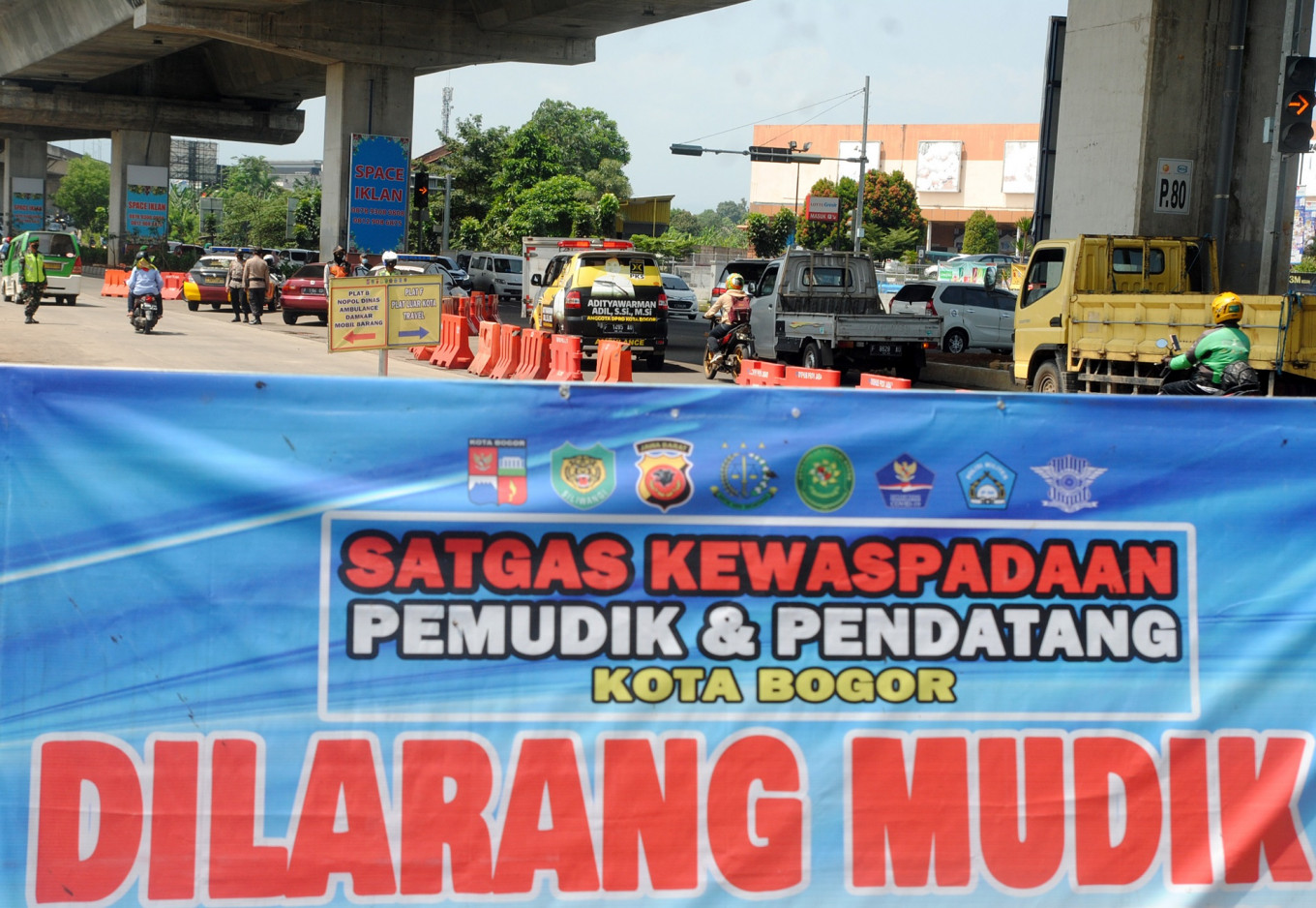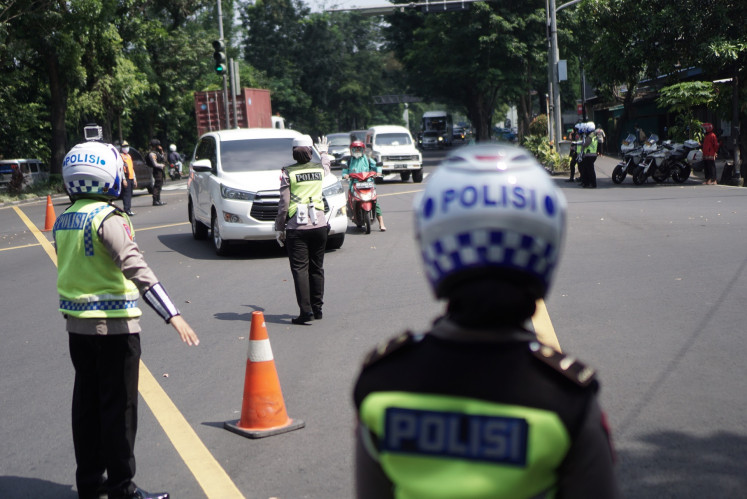Govt U-turn on local ‘mudik’ vexes regions
Local administrations in urban areas are left confused over how to enforce the government's sudden change of policy on mudik (exodus) travel in urban agglomeration areas.
Change Size

T
he government’s last minute announcement on restricting people from traveling within urban agglomeration areas during the Idul Fitri holiday to prevent COVID-19 transmission has left local administrations and homebound travelers puzzled and enraged ahead of the Islamic holiday.
Authorities had been firm since late March about banning people from going on mudik (exodus) from May 6 to 17 in an attempt to prevent a surge in confirmed COVID-19 cases across the country — a trend usually occurs following a long holiday period.
Indonesian health authorities recorded a 69 percent rise in its daily averages of new coronavirus cases around two weeks after last year’s long Idul Fitri holiday. Another surge was recorded several weeks after the Christmas and Year-End holiday season in January, when dozens of provinces saw their hospital bed occupancy rates exceed the ideal figure of 60 percent to guarantee prompt treatment.
Read also: Thousands turned back to stop Idul Fitri exodus
Despite the ban, the government initially allowed people to travel within urban agglomeration regions during the Islamic holiday, including Greater Jakarta, the Medan metropolitan area in North Sumatra and Greater Surabaya in East Java.
Under such a policy, people living in big cities such as Jakarta would still be able to visit their relatives living in surrounding regions — such as West Java’s Bogor and Depok as well as Banten’s Tangerang — during Idul Fitri, which falls on Thursday.
However, the government backpedaled on the policy on Thursday, the first day of the mudik ban. The restrictions will also last until May 17.
“We decided to ban all sorts of mudik travel across regions or within an agglomeration area to minimize physical interactions that may lead to COVID-19 transmission,” national COVID-19 spokesperson Wiku Adisasmito said on May 6.
He added that mobility within an agglomeration region would still be allowed during the period for “urgent and other purposes not related to mudik” such as employees going to work or logistics transportation.
Some big cities such as Jakarta and Surabaya are known as epicenters of the outbreak due to the high number of cases confirmed in the regions. Large movement of people from the big cities is feared to cause the virus to spread further.

Without enough time to prepare measures to limit visitors within agglomeration areas, some regional leaders claimed they were struggling to monitor the restrictions in their respective areas.
“We’re baffled with this update because the Home Minister said in a recent meeting that mudik trips within agglomeration areas were still permitted. Suddenly, it changed,” Tangerang Mayor Arief Wismansyah said on May 6, as quoted by kompas.com.
Benyamin Davnie, the mayor of neighboring South Tangerang in Banten, slammed the sudden policy change, calling it too late. He added it would be difficult for his administration to prevent people from going on local mudik trips.
Despite the ban on local homebound travel, the Transportation Ministry has not required local administrations to set up checkpoints in their borders to prevent violations.
Benyamin was echoed by Bogor mayor Bima Arya, who ordered local authorities to carry out random checks to find possible violators. Despite the effort, he said it would be difficult to distinguish between people traveling for mudik or not.
“We’ll try our best to enforce the policy. Among our efforts is carrying out COVID-19 antigen rapid tests for people entering the city during the ban period,” Bima said.
Read also: Policy inconsistencies muddy 'mudik' measures
Jakarta Transportation Agency head Syafrin Liputo said the agency tried to identify homebound travelers by the amount of luggage and people in their vehicles, judging that mudik travelers would carry more luggage and passengers.
On the other hand, several regional leaders responded to the sudden and hazy details on the local mudik ban by ignoring the policy. Among the leaders were Yogyakarta Governor Hamengkubuwono X and Surakarta Mayor Gibran Rakabuming Raka.
“If we apply a ban on local mudik, we’ll have difficulties in stopping [people] because there are many roads leading in and out of Surakarta,” said Gibran, who is the son of President Joko “Jokowi” Widodo.
Authorities are concerned that this year’s Idul Fitri mudik season will trigger a surge in COVID-19 cases following the recent discovery of the B.1.617 variant of the coronavirus. The variant, first found in India, is believed to transmit more easily than other strains.
On Monday, the World Health Organization classified B.1.6.17 as a “variant of concern”, which also includes variants first found in the United Kingdom (B.1.17), South Africa (B.1.351) and Brazil (P.1).
The government fears this year’s Idul Fitri holiday will cause another spike as occurred in India recently. The South Asian country’s healthcare system has been struggling to contain another wave of the outbreak that is suspected to have been caused by huge social gatherings.
As of Tuesday, India has seen around 300,000 new cases and around 4,000 deaths daily.
Read also: Bribes, lies and black sticky rice: Indonesians outsmart 'mudik' ban
Coordinating Economic Minister Airlangga Hartarto, who also heads the National Economic Recovery and COVID-19 Response Team, claimed around 4,000 of 6,700 mudik ban violators tested positive for the coronavirus. They were randomly tested by health officials at various checkpoints across the country.
Epidemiologist Dicky Budiman of Griffith University in Australia said it was possible for Indonesia to see a COVID-19 case surge after the Idul Fitri holiday because authorities were late in enforcing the ban on mudik within agglomeration areas.
“Local authorities also don’t have an established system to enforce the restrictions. Meanwhile, our testing rate is very low,” he said.
As an attempt to prevent massive spread of the virus during the Idul Fitri holiday, Health Minister Budi Gunadi Sadikin urged local administrations to speed up vaccine rollout for at-risk groups such as the elderly, who are more susceptible to COVID-19.
But the vaccination drive for the elderly remains sluggish, with only around 1.8 million of the targeted 21.5 million elderly people fully vaccinated as of Tuesday.









